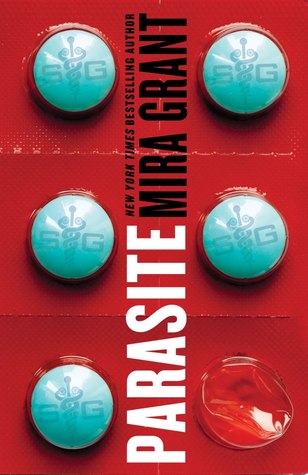
There is a point, when reading medical, forensic, or even psychological thrillers that you realized you have become a wealth of useless information. You can easily identify the age (and species) of maggots (thank you Kathy Reichs) that the term “crazy cat lady” is legitimate. Derived from a parasite called toxoplasmosis that causes schizophrenia in humans. That the latin word for “sleepwalking” is actually noctambulism. I for one am a fan of over education. (It helps me keep my Scrabble crown.) But most are not. If you are one of these people…you won’t like this book. Simple as that.
We owe our good health to a humble parasite – a genetically engineered tapeworm developed by the pioneering SymboGen Corporation. When implanted, the tapeworm protects us from illness, boosts our immune system – even secretes designer drugs. It’s been successful beyond the scientists’ wildest dreams. Now, years on, almost every human being has a SymboGen tapeworm living within them.
But these parasites are getting restless. They want their own lives…and will do anything to get them.”
My initial reasoning for purchasing Mira Grant’s “Parasite” was because I needed a change. To be blunt, I was in a reading rut. Conveniently enough for me, this rut reared its ugly head during the voting process for Goodreads “Best of 2013.”
“This is it!!” I thought to myself, the opportunity to find something new, and attack it was fervor. So I shuffled my way over to the horror category and there it was. Red cover like a beacon in a storm. Leading me home. (Ok, maybe it wasn’t quite so dramatic.) After reading the rather oogey synopsis I was sold. Tapeworms? How disgustingly fantastic is that? Then I started reading, and what I read was NOTHING like I had expected. Instead of horror. Instead of invasion of the body snatchers via tapeworms on meth, I got a story of a girl who hadn’t the faintest idea of who she was. Admittedly, her story (or at the very least the reasoning behind her sudden memory loss) was predictable, but that didn’t keep me from reading.
Why? Because there is nothing more interesting that a 6 year-old (mentally, not physically) trying to navigate their way through a medical/biological nightmare.
And that is what “Parasite” is. A medical/biological thriller with a dash of “zombie-ism” thrown in for sport. NOT A HORROR. (Which I was ok with.)
This book is compression packed with medical and scientific jargon. (Which at least 25% I view as totally unnecessary.) It is also VERY MIRA GRANT. (Those of you that have read “Feed” will know exactly what I’m talking about.)
Grant breaks stories into fragments, and then pieces them back together to illustrate a solid point. In “Feed” it was blog posts from the main characters. In “Parasite” its interviews, articles, autobiographies, even advertising slogans (all having to do with supporting cast.) They are all found at the beginning of chapters, and they all illustrate the complexity of the characters (or situation.) The problem is, they staunched the flow of the story. Instead of moving seamlessly from chapter to chapter you find yourself having to muddle through a “Rolling Stones” article. I read each and every one of them but truthfully…if I hadn’t, I wouldn’t have missed them. (What does THAT say about excessive info?)
But I digress, let’s talk about the more important things. The characters. The story as a whole.
First, both were good. Not great, but definitely good. In particular Sal. (The lead protagonist.) Sal was the most defined character in the story. She was also the most real. She represented the reader. Naive. Curious. Lost. She had to make it through the story to fully understand what was happening around her. Much like myself. (Though I wasn’t quite as lost as she was. Thankfully.) There was also her family. (Arrogant father. Bitter mother. Annoying sister.) Her boyfriend (suspiciously perfect and barely touched upon.) Tapeworms. (Yeah…not going there.) And a slew of “God complex” riddled scientist. In short, it was a well-rounded cast. (Despite the lack of character development in several of them.)
As for the plot…it was compelling, until the last chapter. When it careened off a cliff. There were the appropriate amount of twists. (Most of which I mentally predicted.) There were questions asked AND answered. There was even a somewhat obvious (yet still well written) set-up for book two.
So what happened?
I have no idea!! No, really…I HAVE NO IDEA!! It felt like I read 512 pages just to slam my face into a brick wall on the last page. It felt broken. It wasn’t really a cliffhanger, more of a fragmented sentence. It just stopped. And then I did. I got up, said WTF! and then dropped the book, a completely dumbfounded look on my face.
INCOMPLETE.
That is the only word I could think. Despite this being the first book in a series, the entire book felt…incomplete.
So that is where I will leave you, so that you will understand my sentiment.
This book was……
Happy reading my fellow Kindle-ites and remember: Sometimes its better to not remember.
Add it to your Goodreads shelf / Amazon wishlist
| Rating Report | |
|---|---|
| Plot | |
| Characters | |
| Writing | |
| Pacing | |
| Overall: | 3 |







I read the ARC of this book last year. Despite the scientific jargon thrown in (which I agree a lot of it was unnecessary) I thought the explanations were too simple and not very thought out at all. I think I found this would have read better as a YA novel.
I too felt this was more of a YA novel and I am certainly hoping that there is to be a sequel…
I never thought of that!! It WOULD have made a better YA. The concept of her having to learn everything again screams “growth experience”